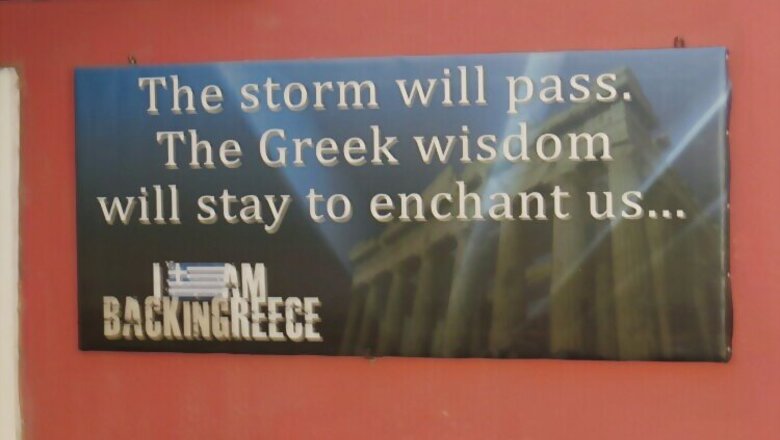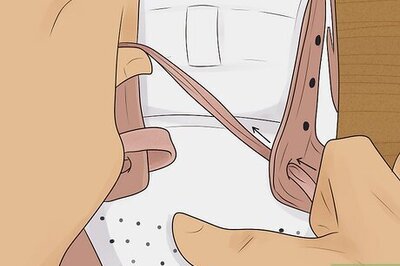
views
I am doing this for the sake of my children, say ordinary Greeks who are in a state of resignation putting their dreams and aspirations in a state of perpetual hold. The ad-hoc solutions hatched out by the creditors, the European Central Bank and the Greek parliament have neither energized nor impressed the Greek citizens.
A first-hand report from the streets of Athens and the Greek islands as ordinary Greeks grapple with the "new normal"
There is an interesting expression in the West. “Kicking the can down the road” means to put off or conveniently postpone a problem. Most Greeks believe this is what has been done by the powers that be. I had the rare opportunity to travel around Greece during this recent tumultuous time in their history and economy, talk to ordinary citizens and hear what they are going through.
“My employer does not pay me directly. I have to get my salary through the bank. However for many days I could draw 65 Euros at a time from the bank as the banks are afraid that they will get emptied out,” says Elena who works with the port on the highly popular Mykonos Island. She has three college-going children who face an uncertain future like most other youth of Greece. Elena has herself worked as a manager in a bank for 15 years in her career and is frustrated by the current situation.
While that is the story of the working people, the retired and the elderly are worried about other things – some a matter of life and death literally. Pharmacies are running out of essential drugs, their pensions are not likely to reach them in a timely manner either.
Comparisons are being drawn to the East Asian crisis nearly 20 years ago where the so-called austerity measures and IMF intervention only led to misery and bloodshed on the streets. The GDP of Greece has shrunk by one-fourth in the last 7 years. Unemployment is at 25 percent and the youth are the worst off. The common perception amongst the Greeks is that the powerful forces like the International Monetary Fund, the European Central Bank and the other stronger nations are taking advantage of Greece’s vulnerable situation and pushing them into further misery. “Our quality of life is already miserable. What further sacrifice do these financers want us to do”, said one Athens resident adding, “I know I will not land any great prospect in my career or lifetime. I voted NO keeping the interests of my children and the younger generation in mind” referring to the referendum held earlier this month. Parents worry that their young kids will never get the right kind of education and opportunities they deserve. There is palpable pessimism all around. Younger people wonder if they will ever get decent jobs for the next few years.
“I am highly qualified. I have a PhD. But that is of no use and I am stuck in a low-paying job for no fault of mine”, says Sophokles Arramitis who manages a motel in the hugely popular island of Santorini. Tourism is one of the backbone industries that has sustained the Greek economy. But with all the negative buzz about the country, many tourists are staying away. A lot of young people from the capital Athens head to the attractive islands in search of seasonal work. Manos Youklipolis who works on the Mykonos island missed his opportunity to vote as he was busy working. “My job is important when there is such high unemployment in the country. But I would have voted NO had I gone to the booth,” says he, pointing to the fact that nothing has changed for the Greeks in the last 5 years and hopes a drastic message to the EU could bring about some change.
There is universal frustration about the politicians and the oligarchs. The general feeling on the street is that the politicians and their wealthy cronies were busy pursuing their own interest while the country was heading to the brink. Every second person had the same question: Why did they bring the country to the edge? They could have dealt with the situation long time ago instead of playing this game and gambling with all our futures. People are fuming at the politicians and are angry at the rich class who have remained aloof and immune to the crisis. Besides the daily hardships and the bleak future that stares in the face of the Greek people, the confidence at the individual level has taken a severe beating. National pride is high but the self-esteem of the people I spoke with was severely low.
The looming crisis and the real difficult questions have been staved off for now. All sides are feeling stuck at the moment while the most pain is being felt by the ordinary Greeks. Mostly face-saving gestures and tactics have been used to unravel the present stalemate. Emergency meeting after emergency meeting goes on in Brussels and elsewhere – but the real emergency seems to be for the ordinary Greeks who are struggling to meet their daily needs.
Is this a precursor to Greece’s departure from the EU zone and the European Union? Is Greece going down a dangerous path of economic disaster? Only time can answer these questions. For now, the Greek drama will continue in its new manifestations. Citizens will continue to deal with anguish and confusion for the immediate future. Ordinary Greeks have remained calm and have mostly taken the non-violent path to show their anger and frustration towards the forces that are working against them. The Constitution Square or Syntagma Square which is the hub of the protests has a constant buzz of protestors with signs and congregations of small groups. Media vans and reporters still throng the area using the solemn Parliament building as the backdrop for their cameras. Pointing to the rest of the 18 countries in the European Union, one Greek at the Square said ruefully, “How can the rest o
f the family be happy when one of the family members is suffering so much?”
The Noble Laureate economist Paul Krugman recently commented in one of his columns pointing out that the Greek crisis ”isn’t about analysis – it is about power”. For the rest of the world, there may be a lesson in here somewhere. In the highly intertwined economy that we all live in, leading someone else down the path to disaster is bound to drag us all into the abyss as well. And alas yet another reminder that divisive politicians and global institutions siding wealthy financiers do not necessarily have the well-being of the common man on top of their agenda!
Venkatesh Raghavendra is based in Washington D.C. and promotes philanthropy through the American India Foundation. [www.aif.org]




















Comments
0 comment